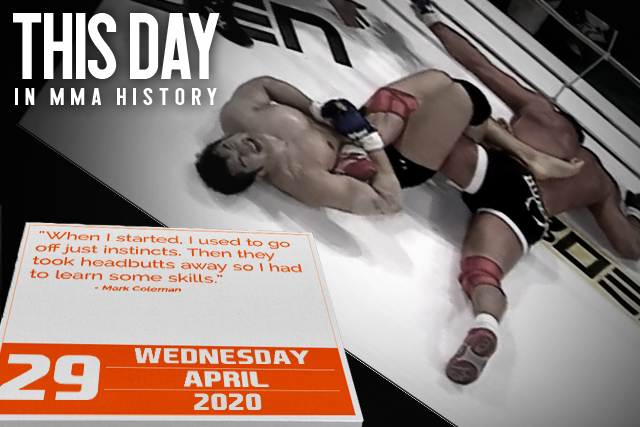
Pride Fighting Championships in early 1999 was still finding its footing and was a far cry from the legendary promotion that would spend several years in the early 2000s as arguably the world’s premier MMA organization, outclassing even the Ultimate Fighting Championship.
Advertisement
The event also featured the Japanese company’s most unlovely practice—one that, mercifully, would soon disappear, even though other Pride peccadilloes like gross mismatches were there to stay—as the main event between Nobuhiko Takada and Mark Coleman is one of the most infamous fixed fights in mixed martial arts history. A major driver behind Pride’s founding had been pitting professional wrestlers against real fighters in real fights, and its genesis was the matchup between Takada and Rickson Gracie.
Unfortunately, unlike younger puroresu compatriots with amateur wrestling backgrounds such as Sakuraba and Kazujuki Fujita, the 37-year-old Takada simply never turned into a good fighter, yet his marketability hinged on creating the impression that he was. By the time Takada and Coleman met at Pride 5, Takada’s MMA record consisted of two humiliating thrashings by Gracie bookending an easy win over MMA neophyte Kyle Sturgeon in a fight now strongly suspected to be fixed, as well. Unlike Sturgeon, Coleman was absolutely a good fighter—even those fans who thought he was on the downslope of his career were forced to admit that, physically, he was largely the same man who had won the inaugural UFC heavyweight championship just a few years before. As such, Takada’s heel hook victory smacked of a worked fight, and fans mused almost immediately that something smelled. In the years since, Coleman has all but confirmed that he threw the fight in return for the assurance of future bookings with the promotion.
If there was any doubt that the strangely clunky-looking fight and finish were a fix, the two men’s professional trajectories would seem to confirm it. Coleman would go on to prove that reports of his professional demise were greatly exaggerated, as he won the Pride Openweight Grand Prix the next year in MMA’s first great career comeback. He then went on to remain a solid fighter for nearly another decade, riding out the 2000s with Pride before returning to the UFC for one last three-fight run. Meanwhile, Takada never won another fight, finishing his career 2-6-2. Despite that dismal showing, his importance to the sport would be difficult to overstate; it might be fair to call him the greatest bad fighter there ever was. He remains deeply involved with MMA to this day and is currently a matchmaker and sometime figurehead for the Rizin Fighting Federation, alongside some of his old Pride cohorts.
More




 On This Day In MMA History
On This Day In MMA History

